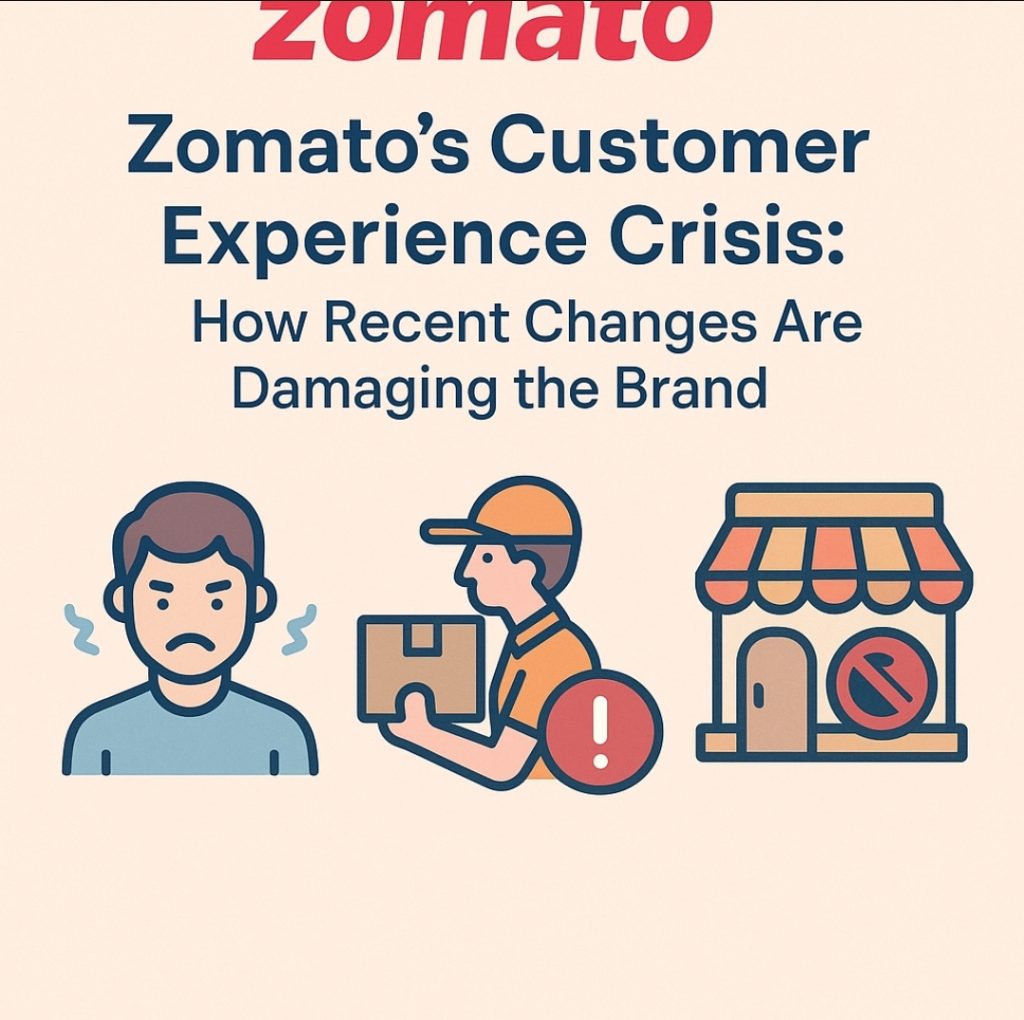Zomato finds itself in turbulent waters these days. The food delivery giant faces mounting pressure from multiple fronts. Workers strike over pay cuts while restaurant partners boycott new policies. Meanwhile, customers increasingly question the platform’s value proposition.
The Perfect Storm of Discontent
Let’s start with what’s happening on the ground. Delivery workers in Thiruvananthapuram launched a 48-hour strike on July 5-6. Additionally, they protested Zomato’s new “Select to Go” system. Furthermore, this system reduces their earnings by up to 30%.
The All India Gig Workers’ Union organized this protest. Moreover, workers complain about impossible choices. They must either wait endlessly without orders or accept reduced payments. Consequently, many experienced workers feel forced into the “Select to Go” option.
However, the problems run deeper than simple payment disputes. The app incorrectly tracks working hours. It shows only 9-10 hours despite workers logging 12-14 hour days. Therefore, this creates misleading earnings portrayals. Additionally, delivery agents face long restaurant wait times without compensation.
Restaurant Partners Push Back
Simultaneously, restaurant partners increasingly boycott Zomato’s services. The platform introduced long-distance service fees ranging from INR 15 to INR 35. Furthermore, these fees apply to deliveries beyond 4 km. Consequently, this adds to the existing 30% commission burden.
Restaurant owners claim these charges breach promised 30% caps. Moreover, they squeeze already thin profit margins further. One restaurant owner stated the situation becomes “unsustainable.” Therefore, many partners seek alternative platforms.
Beyond pricing issues, restaurants express frustration with customer support. They describe Zomato’s support as often unresponsive. Additionally, unwanted ad placements negatively impact their businesses. Consequently, dissatisfaction grows among partner establishments.
The National Restaurant Association Intervenes
The National Restaurant Association of India (NRAI) stepped in recently. They initiated talks with Zomato CEO Deepinder Goyal. Furthermore, they raised concerns about price parity clauses. These clauses discourage restaurants from signing new agreements.
Meanwhile, frustrated restaurant owners explore alternatives. They turn to platforms like Open Network For Digital Commerce (ONDC). Additionally, they consider Rapido’s Ownly for food delivery. However, these alternatives face adoption and market penetration challenges.
Customer Experience Takes the Hit
These internal conflicts directly impact customer experience. Firstly, reduced delivery worker satisfaction affects service quality. Unhappy workers provide less enthusiastic service. Moreover, they may rush deliveries to maximize earnings.
Subsequently, longer delivery times become inevitable. When experienced workers strike or leave, service quality drops. Additionally, new workers lack the efficiency of seasoned professionals. Therefore, customers experience delays and inconsistencies.
Furthermore, restaurant boycotts reduce platform variety. Customers lose access to favorite establishments. Consequently, they must settle for fewer options. This limitation damages Zomato’s core value proposition of extensive choice.
Business Values Under Scrutiny
Zomato’s handling of these crises reveals concerning business values. The company introduced pay cuts without transparent communication. Additionally, they implemented tracking systems that misrepresent worker hours. These actions suggest disregard for worker welfare.
Moreover, the platform’s treatment of restaurant partners raises ethical questions. Introducing new fees after establishing partnerships appears predatory. Furthermore, unresponsive customer support indicates poor relationship management. These practices contradict customer-centric business values.
The company’s response to worker demands demonstrates their priorities. They ignored May submissions from workers. Subsequently, this led to the current strike. Therefore, Zomato appears to prioritize profit over stakeholder relationships.
Growth Implications and Market Risks
These issues threaten Zomato’s long-term growth prospects. Firstly, worker dissatisfaction creates operational instability. High turnover rates increase training costs. Additionally, service quality inconsistencies damage brand reputation.
Restaurant partner defections pose immediate revenue risks. Each departing partner reduces commission income. Moreover, reduced restaurant variety weakens competitive positioning. Consequently, customers may migrate to competitor platforms.
The NRAI’s intervention signals industry-wide concerns. If major restaurant associations oppose Zomato’s policies, widespread boycotts may follow. Therefore, the company faces potential market share erosion.
Customer Trust Erosion
Perhaps most critically, these issues erode customer trust. Customers witness strikes and restaurant boycotts. They experience longer delivery times and reduced options. Consequently, they question Zomato’s reliability and value.
Social media amplifies these concerns. Negative experiences spread rapidly online. Additionally, striking workers and frustrated partners share their stories. Therefore, Zomato’s brand image suffers public damage.
Customer acquisition costs rise when trust erodes. Retaining existing customers becomes more expensive. Moreover, attracting new customers requires increased marketing investments. Consequently, profitability margins shrink.

The Path Forward
Zomato must address these interconnected challenges immediately. They need transparent communication with all stakeholders. Additionally, they should reconsider policies that damage partner relationships. Furthermore, worker compensation structures require urgent revision.
The company should prioritize stakeholder satisfaction over short-term profits. Happy workers deliver better service. Satisfied restaurant partners provide more options. Consequently, customers receive superior experiences.
However, time is running out. Competitors capitalize on Zomato’s struggles. They offer better terms to disgruntled partners. Additionally, they promise superior working conditions to delivery workers. Therefore, Zomato risks losing market leadership.
Conclusion
Zomato’s current crisis extends beyond simple policy disputes. The company faces fundamental questions about its business model and values. Worker strikes, restaurant boycotts, and customer dissatisfaction create a perfect storm.
These challenges directly impact customer experience through service degradation. They threaten business values by revealing stakeholder neglect. Most importantly, they jeopardize long-term growth through market share erosion.
The food delivery giant must choose between short-term profit maximization and sustainable growth. Their decision will determine whether they emerge stronger or continue declining. Currently, all signs point toward a company prioritizing profits over people—a strategy that rarely succeeds long-term.

